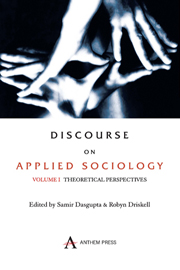Book contents
- Frontmatter
- Contents
- Preface and Acknowledgement
- Contributors to this Volume
- List of Abbreviations
- Introduction
- 1 Re-Orient World History, Social Theory and the Nineteenth Century
- 2 The Unique Complexity of Social Phenomena and the Uses of Social Science Knowledge
- 3 Unlimited Love, Compassion and Forgiveness: Acts of Moral Examplars
- 4 Theoretical Application
- 5 Applied Sociology's Need to Rethink the Tradition: Sociological Theorizing in a Global Framework
- 6 Social Analysis and Social Action
- 7 The Applied Sociologist as Craftsman
- 8 Applied Sociologists: Its Problems and Prospects
- 9 Sociology and its Application in Society: Giving Sociology its ‘Working’ Meaning
- 10 The Evolution of Sociology Back to its Applied Future
- 11 Contemporary Corporate Crime: Theoretical Perspectives, Cases & Consequences
- Index
8 - Applied Sociologists: Its Problems and Prospects
Published online by Cambridge University Press: 05 March 2012
- Frontmatter
- Contents
- Preface and Acknowledgement
- Contributors to this Volume
- List of Abbreviations
- Introduction
- 1 Re-Orient World History, Social Theory and the Nineteenth Century
- 2 The Unique Complexity of Social Phenomena and the Uses of Social Science Knowledge
- 3 Unlimited Love, Compassion and Forgiveness: Acts of Moral Examplars
- 4 Theoretical Application
- 5 Applied Sociology's Need to Rethink the Tradition: Sociological Theorizing in a Global Framework
- 6 Social Analysis and Social Action
- 7 The Applied Sociologist as Craftsman
- 8 Applied Sociologists: Its Problems and Prospects
- 9 Sociology and its Application in Society: Giving Sociology its ‘Working’ Meaning
- 10 The Evolution of Sociology Back to its Applied Future
- 11 Contemporary Corporate Crime: Theoretical Perspectives, Cases & Consequences
- Index
Summary
Social Realities in Crisis
I think I do not err in assuming that, however diverse their views on philosophical and religious matters, most men agree that the proportion of good and evil in life maybe very sensibly affected by human action. I never heard anybody doubt that the evil maybe thus increased, or diminished; and it would seem to follow that good must be similarly susceptible of addition or subtraction. Finally, to my knowledge, nobody professes to doubt that, so far forth as we possess a power of bettering things, it is our paramount duty to use it and to train all our intellect and energy to this supreme service of our kind.
(Huxley, cited in Lester Ward's Applied Sociology, 1906)Are sociologists, therefore, getting back to their original roots? Applied sociology has its own tradition, which urges its practitioners to raise the question – ‘Sociology for whom and for what purpose?’ Simplistically speaking, those sociologists should not trouble themselves any further to open new avenues for intellectual stimulation. If such a process continues it is undeniable that we will touch the borderline of post risk society and simulacra-fashioned ‘sociological imagination’. The reality of the unreal has already dominated the field of theoretical puzzles. The other name for theoretical simulacra is postmodern theoretical abstraction. Alfred McClung Lee (1976) feels that ‘the character of any sociological inquiry depends upon by and for whom it is conceived and applied.
- Type
- Chapter
- Information
- Discourse on Applied SociologyTheoretical Perspectives, pp. 179 - 222Publisher: Anthem PressPrint publication year: 2007



